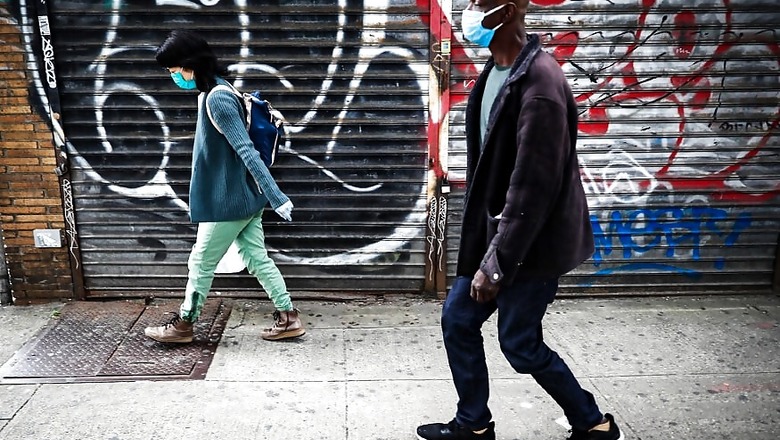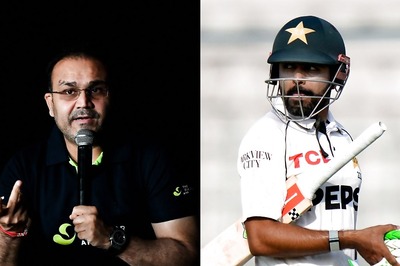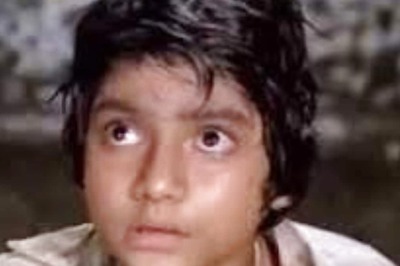
views
Sunil (name changed) was 17 when he came to the Service for Healthy Use of Technology (SHUT) clinic in Bengaluru about one and a half years ago. His father reported he was using his mobile phone excessively. The clinic started by the National Institute of Mental Health and Neurosciences (NIMHANS) deals exclusively with technology-related mental health issues. Sunil had improved before the lockdown, reducing his screen time from around eight hours a day to about four, says Dr Manoj Kumar Sharma, clinical psychologist at SHUT.
Since the lockdown to contain the spread of Covid-19 came into effect, this has increased again. For the most part of the day, Sunil is on his phone playing games, chatting with friends, or watching shows.
“I can control it but I feel like there is no other option. There’s no college, no online classes also, no homework,” Sunil says over the phone from Kalaburagi district in Karnataka.
“My parents feel I use my phone a lot. This has sometimes led to family arguments. They also have this fear that I might fall victim to online fraud. They still think I am a small child and are worried for me. I want to reduce usage, but during lockdown it is difficult as there are more online friends and more gaming I am getting involved in,” he says.
With some relaxation in the lockdown, Sunil is now spending more time playing outdoor games, meeting friends he can and tracking his online usage through a mobile application. To begin with, children can address the concerns parents are raising and listen to them, says Sunil, acknowledging his parents’ concerns.
“We are getting calls from adolescents and adults. The main issue for adolescents is an addiction to technology. The reasons are boredom, free time, peer pressure, no activity. This leads to biological distress like impaired sleep and appetite. Another group is of people who were already using it excessively and have increased it further. The third case is pornography addiction,” says Manoj Kumar Sharma.
“In some cases that we are seeing, children who don’t have a major gaming habit also have this issue during lockdown. They spend significant time, around 10-12 hours, and the family distress around this is also significant. Most families have a single child. There’s significant use of technology in such homes. What we understand from the children who call us is that the parents are around so the child feels the parents are too much into their lifestyle. To avoid this and relieve stress, they play online games. On the other hand, the parents are concerned about how the child will structure academics after the lockdown. Most parents who call us report significant distress, mood changes in their children,” he says.
In a study conducted by Child Rights and You (CRY), an Indian NGO working for child rights, it was found that most of the respondents (parents/guardians) stated that the lockdown has increased the screen time for the child by about 45%. Only one in every ten respondents (11%) asserted that it has not had much impact. The percentage was more or less similar in those who have children aged 5-18 years (45% – to a great extent; 44% – to some extent, 11% – not really). Less than half of the parents (43%) stated that they always keep a watch on online activities of the child. This included supervised access to the internet, child lock to protect children when online. However, 18% stated that they never keep a watch.
More than 50% of the parents reported that their child has become more agitated or anxious during the lockdown period.
This study was done two weeks after the nationwide lockdown began. The survey was rolled out in April on social media platforms of the NGO where a self-administered questionnaire with around 30 questions was used. The questionnaire received 1,102 responses from 23 states and union territories in India.
Another study by CRY conducted among school-going adolescents in the age group of 13 to 18 years, spread across urban and rural areas of Delhi-NCR (NCT of Delhi, Noida and Faridabad), pointed out that increased screen time and unsupervised access to online platforms by the children was worrisome as one in ten children has experienced cyberbullying and hacking or misuse of profile and every fifth child has experienced seeing a morphed image or video. In both cases, only half of them reported it to anyone. Six hundred and thirty adolescents across eight schools in Delhi-NCR were selected for this study.
Both studies suggest proactive engagement of parents and caregivers, and supervised internet usage. Parents can also be provided online training on ways of engaging with children constructively. The authors of the study suggest this as one of the ways to provide a window to parents to shed their share of anxiety and also provide a scope to bond with the child. For maintaining the daily routine for the children, parents may be suggested to make a flexible time table. While a rigid timetable may or may not function in the context of the household, a timetable can be used as a way to help children not to deviate from their daily schedule and also inculcate discipline. In addition, the study also recommends strengthening cyber laws to make it more child-centric and monitoring content involving and targeting children.
“Now the children are at home all the time. It is manageable if the family is stable. But if there are differences between the parents, children now witness it more frequently since they are at home. In some cases, if there is an elderly person at home, family differences are even more. There are arguments over who will take care of the elderly person after a point. In some other cases we have seen, children want to have different kinds of food. The mother would be happy to make these initially but since the lockdown has been there for long, she would feel burdened too after a point. This also leads to some differences between the child and parent,” says Lakshmi Vijayakumar, founder, suicide prevention centre Sneha.
More than five lakh students wrote their last pre-university exam in Karnataka in June. The number of parents waiting outside exam centres for their children to finish was unusual compared to the pre-pandemic era.
“I am worried. I wasn’t sure at all when my daughter had to come in to write her exam amidst the pandemic. As a parent, I was scared I wasn’t sure of the safety precautions in place,” says Jitendra Gholat, a parent waiting outside a PU exam centre in Bengaluru.
With the sudden announcement of a nationwide lockdown to contain Covid-19, the twelfth class students had only one examination pending: English. Now, they would all go their separate ways, but there were no handshakes or hugs.
“There was social distancing in place, we wore masks throughout, arrangements were good. But I don’t know when I am going to see my friends again. I don’t know what is going to happen next,” says Aditi after stepping out of the centre.
It was perhaps the first big massive exercise for the state government after Covid-19 hit. A total of 1,016 centres were prepared to ensure a safe environment for students to write their exam safely. At the end of it, it seemed like the biggest part of it was over. But it wasn’t. The consistent uncertainty has left lakhs of students changing their plans that could alter their future in one way or another.
Mohammed Rabiyyath Aslam is a student of St Aloysius Pre-University College in Mangaluru. He had his mind set on studying abroad for his bachelor’s degree until the pandemic changed plans.
“I had applied to UK universities. I received admission at Manchester University. But now, I can’t travel. Even if I accept the offer, I’ll have to take the first few months through online classes. I don’t think that’s effective. I might take a break this year. I am in a very confused state. Taking a break wasn’t an option. I have backups. I have applied in India as well. Just waiting for the results. I will continue here itself. I totally didn’t expect this,” he says.
Rabiyyath had plans with friends to travel, to watch the IPL matches, all of which are shelved now. An extrovert, the lockdown was hard for him, he says.
“Life was smooth. The future was all planned. That has changed. I spent time helping my family with household chores. I did something I thought I’d never do: cooking, baking cakes. The rest of the time I was just binge-watching shows,” says Rabiyyath, who is also the president of the student council.
“I reached out to many students who were going through a lot of stress. Their mental health was in bad shape. I tried to be there for them. If I couldn’t help I was set to get professional help for them too but that wasn’t needed. We are all coping with this deviation,” he says.
However, for Pradeep Dilip, a Science student, the lockdown period gave him ample time to decide what he wants to do next academically. Though the lockdown affected him as a basketball player.
“I played under-16 basketball at the national level last year. This year there had to be under-18 state level matches which has not happened. That affected me. I did not play at all during two months of lockdown. I exercised at home instead,” says Pradeep.
Many others planned to move out of their homes, study in a different city at least but have changed that plan.
“I applied for colleges in Bengaluru because I wanted to move there. My seats are confirmed too but parents asked me to apply here in Mangaluru. Now wherever you apply, you need to pay the fee within the stipulated date to confirm the seat, but with this uncertainty, how do we decide? So, for now I won’t be moving out because Covid numbers too are seeing a sudden spike. Initially I used to check the numbers for each place every day. Then I figured it was better to stop seeing the increasing numbers as it was affecting me negatively. Now I check the overall India numbers and Mangaluru numbers only,” says Azaan Ibrahim, another student.
Following the exam on June 18, rumours surfaced of a student who attended the exam testing positive for Covid-19. The rumours even found place in some regional channels, adding to the worries of students like Azaan and many parents. The student had in fact tested negative. The father of one of the students had tested positive.
While some followed the precautionary measures, others were worried even during the exams.
“It has been very hard. We were very anxious and restless. It’s a good thing that the exam is over. I was genuinely scared. I have been at home for a long time now. Putting on a mask was very difficult since I have breathing issues. But when I went for the exam I saw students hugging each other, violating social distancing norms. Some aren’t realising the seriousness. I had plans to study in Bengaluru too. But now I have decided to study here itself,” says Letitia D’ Costa, another student from Mangaluru.
Karnataka’s state helpline has received 4,469 calls so far from students between the ages of 12 and 15. A total of 2,559 or 45.84% of these reported memory problems, 1,704 reported lack of concentration and 206 reported acute stress.
For those wanting to write competitive exams, the wait seems never-ending.
“I was supposed to write the CLAT (Common Law Admission Test) in May. It got postponed. I thought it will happen in June. That didn’t happen either. I am constantly worried. I have taken college exams which allow online options. What is helping is the colleges are constantly sending emails, updating us. Even they are not sure when this will all be fine,” says Aditya Thomas, a Commerce student.
The counsellors at the help desk ask the students to eat nutritious food and follow regular sleep time among other suggestions. But every case is handled differently depending on the individual. Studying from a well-lit and well-ventilated space, taking regular short breaks in between studies, practicing yoga and meditation, reading, listening to music, avoiding being lonely, spending time with friends and family and sharing concerns with others are some tips that the counsellors at the help desk suggest.
Early in April, the Chennai-based Schizophrenia Research Foundation (SCARF) began a helpline to support those who wanted support during the lockdown. Initially, the calls were mostly from adults but soon, as exam dates neared, there were increasing calls from adolescents. Once the lockdown was relaxed, this number dipped but recently with uncertainties around reopening schools and colleges, 50% of the calls coming in every day are from adolescents.
“One thing is they are unsure of what’s going to happen about college. Those who are already in college are worried about exams. They have been prepared but there is uncertainty. That’s causing anxiety. They are losing interest and motivation. Many are getting addicted to social media, spending too much time on it. It is affecting their physical and emotional health and they aren’t getting proper sleep because of too much time spent online. When the sleep cycle is affected, eating is also affected. They tend to sleep very late, sometimes early in the morning and wake up around noon. Because of this, breakfast is skipped,” says Subhashini Gopal, psychologist, SCARF.
The adolescents in many of these cases are distant from others, not just physically but also emotionally. There are mood changes too with being irritable towards family members. All of it, sleep, food, interpersonal relationships are interconnected. The students report memory loss, losing touch with what they studied while parents are concerned about bringing the children back to a routine once the lockdown period is over.
“We recommend the parents not be too strict on the children. Adults themselves are not able to handle this lockdown situation, they get frustrated about the situation. The parents are told that the same thing is happening with their children too. The children who are used to a social life are being restricted,” says Subhashini.
She suggests the parents have a friendly talk with the children, give the children home-based activities, share responsibilities at home, cook new dishes together and spend time in conversations. But again, not in an authoritative way but a friendly way. Through her telephonic sessions with the children and their parents, she finds that online games or social media is so rewarding that the children are sometimes unable to get out of it.
No two people who call seeking support approach a situation the same way and thus there is no one solution that would work for all. While some students need only one session, some are referred for multiple sessions. These are telephonic sessions where the children (or caregiver) are helped to identify ways to work around how to deal with the situation.
“Some just need someone to listen to them, vent out. A few cases are such that there were underlying issues. There may have been relationship issues or they may have had anxiety issues which could have aggravated during the lockdown. The majority of those who call us on the helpline just need somebody to talk to and understand them. One call is all it takes for some to deal with what they are going through. One thing is, all of us are worked up during this pandemic, which is expected. We tell youngsters it is not unusual. We help them accept reality and normalise it. Then, you might be able to handle the situation in a calm way. You can’t resolve it with anxiety. Yoga and simple exercises at home are some of the strategies we would advise,” says Subhashini.
Social isolation seems to have a huge impact on the mental health of adolescents who are otherwise not used to being stuck at home. In the present situation, with the lockdown restrictions and threat of the pandemic, they are unable to meet friends and hang out.
Even though the virtual space may have replaced reality to some extent, the human element is absent. The multiple accounts of adolescents only show that anxiety, worry and uncertainty is widely prevalent during this lockdown phase. Experts say if you or anyone you know is seeking support for mental health, call the state health helpline number 104 or the national helpline 011-23978046.
This reporting was supported by the ESSENCE Media fellowship for sensitive reporting on mental health.
Read all the Latest News, Breaking News and Coronavirus News here



















Comments
0 comment